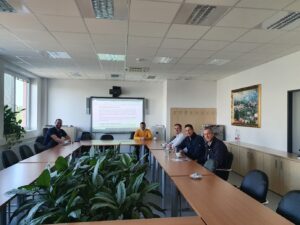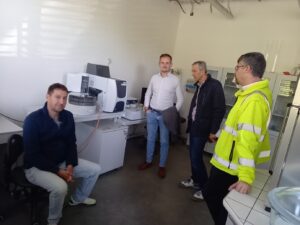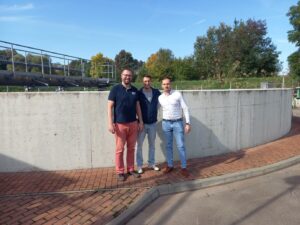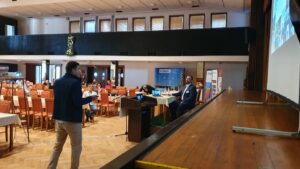In accordance with the sub-tasks of the international project “Use of biochar as materially transformed waste for extensive green roofs”, Reg. No. 22-PKVV-1, financed from the program Strengthening the capacities of public universities in developing countries by the Ministry of Foreign Affairs of the Czech Republic between the Czech Republic and Bosnia and Herzegovina, on October 5th – 7th,2022, a training aimed at increasing the qualifications of the teaching staff of the University of Banja Luka was implemented.
On the first day of the training, an informal meeting was held. There was discussed the education system in the Czech Republic and Bosnia and Herzegovina, the number of students in various study programs, employment of graduates on the labor market, etc.
On the second day, the research team of the AdMaS centre, Faculty of Civil Engineering, Brno University of Technology led by prof. Hlavínek, prepared an educational program for selected teaching staff of the University of Banja Luka. The theoretical part took place in the AdMaS centre, where current trends in municipal wastewater treatment and the use of treated water (including greywater) in blue-green infrastructure applications – green parking lots, green roofs and facades, etc. were presented and discussed in the form of presentations. Furthermore, still at AdMaS centre, an excursion of the installed wastewater treatment technologies (membrane technologies), the use of energy from wastewater (vertical and horizontal heat exchangers), as well as waste (including sewage sludge) heat treatment technologies (medium-temperature and microwave pyrolysis) and its output in the form of biochar took place. After that, the excursion focused on pilot experiment installations (again at AdMaS centre), where biochar, which represents materially transformed sewage sludge, is already applied – green parking lots and extensive green roofs.
Next, the training participants went on an excursion to the Faculty of Civil Engineering and visited the municipal wastewater treatment plants – the large WWTP Brno – Modřice (including a tour of the installed paddle dryer of sewage sludge or tertiary wastewater treatment systems) and the smaller WWTP Lednice.
On the third, final day of the training, the pedagogical staff of the University of Banja Luka completed the so-called research part of the training. A program was prepared in Velké Bílovice where the results of Czech and international research projects in the fields of waste water management, the use of sewage sludge, and the removal of micropollutants from waste water were presented. Dr. Milan Šipka also presented one international research project implemented at the University of Banja Luka called SMARTWATER. The training program was subsequently concluded with a discussion on possible research topics where both educational and research institutions could be involved.
 |
 |
 |
 |


